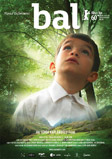Kevin Ilett / Subtitled Online
DVD: Sut
2 Star
Sut is being released as part of The Yusuf Trilogy box set.
Sut (Milk) is the second film in Semih Kaplanoglu’s ‘Yusuf Trilogy’, following 2007’s Yumurta (Egg) and completed by Bal (Honey) in 2010. The trilogy works in reverse-chronological order, so whilst Yumurta followed Yusuf as a grown man (Nejat Isler), a moderately successful poet returning to his hometown after the death of his mother, Sut finds Yusuf struggling through his teenage years. This 2008 Turkish picture was given official selection at the Venice and Toronto film festivals.
Teenage Yusuf, played by Melih Selcuk, works on a small milk farm with his mother, Zehra (Besak Koklukaya), on the outskirts of Tire in Western Turkey. Sut’s narrative follows the mother and son’s attempts to make a living selling their milk and cheese whilst rowing over the direction of Yusuf’s life.
The young man, showing all the signs of adolescent ennui, is an phpiring poet who longs to attain success and free himself of his small-town roots. Zehra despairs that her only son is more likely to have his head in a book than his hands around an udder.
Yusuf is called up for a stint of military service, but fails the medical due to implied epilepsy – the illness proceeds to cause a moment of unexpected drama later on. His other anxieties revolve around Zehra’s affair with a widowed station-master, his own dalliance with Semra (Saadet Aksoy), a fellow shy, creative adolescent, and his attempts to get his poems published in a journal. Yusuf nags the postman, stalks a drunken professor for advice, and holds sorrow for a fellow poet doomed to a life of manual labour…
The film opens with a mysterious sequence: a woman is hung upside down over a smoking pot and, very slowly, a snake emerges out of her mouth. The scene is filmed with restraint, poise and patience, counterbalancing the surreal nature of the situation to fill the viewer with questions and amazement. It’s a striking opening which the rest of the film never lives up to. Whilst Kaplanoglu stoically continues this patient, ambivalent approach throughout the rest of his picture, the sluggish pacing quickly becomes a painstaking, agonising experience due to the utter lack of remaining images or sequences of power or verve. Any further examples of intrigue, drama and excitement are few and far between.
There is simply not enough material here to justify a feature length production.
Any coming-of-age tale lives and dies by the charisma of its central protagonist, even more so in Sut, where the film’s thin premise, snail’s pace and lack of tension or drama rely on the struggles of Selcuk’s Yusuf to sustain the audience’s interest. Unfortunately, Selcuk’s is a blank and unsympathetic portrayal. Whether staring into the distance holding the expression of a wet puppy or reading a book with the air of an unappreciated genius, Yusuf is a dull, self-important teenager whose implied poetic talents are never demonstrated. His anxieties and frustrations are simply the unremarkable moodiness of an average, rather pretentious adolescent.
There is simply not enough material here to justify a feature length production of convincing or engaging drama, or even a series of luscious or intriguing imagery despite the film’s admittedly absorbing aesthetic sensibility. This flaw is evidenced by Kaplanoglu’s penchant for stretching scenes and still shots out to double or treble an expected or appropriate length of time. Now, if this was being done with a steely political tenaciousness or a glacial, provocative tension (as in Haneke’s work, for example), then the film’s pace would be exonerated. As it is, the comically slow narrative momentum only serves to highlight the ordinariness of the film’s action and characters.
Yusuf’s fleeting romance with Semra is distinctly undercooked, as is Zehra’s hidden affair with the kindly station-master. Neither partner is explored, neither relationship analysed. The tensions between mother and son offer nothing new to age-old familial ties, whilst Yusuf’s other adolescent obstacles are similarly unremarkable. The film’s strengths lie with Besak Koklukaya’s portrayal of Zehra, a world-hardened single mother still grphping the attractiveness of her youth. Without the support of interesting dialogue or plot, Koklukaya’s nuanced performance is all the more admirable. Similarly, Yusuf’s miner/poet friend conveys in only a brief appearance the sadness of an unrecognised artist with more heft than Yusuf’s feature-length whining.
Sut is a noble film, with good intentions and an eye for an evocative shot. The director’s patient, humble approach results in tedium, however, when combined with the dull blankness of his leading man, the unremarkable subject matter and lack of narrative interest. Undoubtedly, Kaplanoglu holds interesting thoughts on the concept of the creative individual, those amongst us who long to free themselves from quotidian drudgery through poetry and art. Unfortunately, those interesting thoughts refuse to emerge in this deathly slow tale of adolescent self-absorption.
|
|
|




